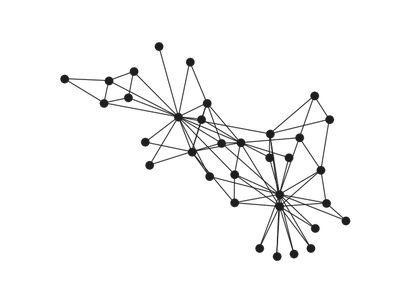CSL7390: Social Network Analysis (Spring 2024)
Offered in Fall 2024 Semester for Diploma

The course will cover the topics listed here. SNA Introduction, Graph Recap: Graph Introduction, Adjacency Matrix, Paths, Connectivity, Incidence Matrix, Distance, Breadth-First-Search, Directed Graph, Weighted Graphs etc.
Network Measures, Centrality, Strong and Weak Ties, Cliques, Component, Structural Balance, Network Models: Random Networks, Scale-Free Networks, Barabási-Albert Model, Fuzzy-Granular Social Network, Generating Network Data
Game Theory and Network Traffic Modeling, Information Cascade, Epidemic spread modeling, Small-World, Community Detection Problem, Link Prediction Problem, Evolving Network and Temporal Network
Python Coding with NetworkX
Textbook
- Networks, Crowds, and Markets: Reasoning About a Highly Connected World, by David Easley and Jon Kleinberg, (Cambridge University Press - Sep 2010) - Prepublication draft available online. http://www.cs.cornell.edu/home/kleinber/networks-book/
- Network Science, by Albert-Laszlo Barabasi, (Cambridge University Press - August 2016) freely available under the Creative Commons licence. http://www.networksciencebook.com/
- Networks, by Mark Newman, (Oxford University Press, 2nd-edition - Sep 2018)
Reference Books
- Complex and Adaptive Dynamical Systems, by Claudius Gros, (Springer, 4th Edition - 2015).
- The Structure of Complex Networks Theory and Applications, by Ernesto Estrada, (Oxford University Press - Dec 2011).
- Exploratory Social Network Analysis with Pajek, by Wouter de Nooy, Andrej Mrvar, and Vladimir Batagelj, (Cambridge University Press, 3rd Edition - July 2018)
Self Learning Material
| Quizzes (LMS) | Assignments | Hands On Exam |
| 10% | 30% | 10% |
| Offline Quiz | Major | |
| 10% | 40% |
Quizzes (LMS)
There will be quizzes in the LMS for each modules. The quizzes will be gamified. Note that you may run many attempts but only the first attempts will be counted for the grading.
Assigments
There will be 3 assignments mixed of coding/paper reading/analytical.Best two of three will be counted towards grading.
Hands on Exam
During campus immersion, you will required to attempt one lab/hands on exam. The exam will be time bounded but open book.
Offline Quiz
During campus immersion, you will required to attempt one 30min quiz with pen and paper.
Major
Major exam will carry 40% of your grading. The questions will be mixed of objective and subjective.
Plagiarism tolerance is 7% from single source and 15% cumulative, anything more will reduce your marks as follows:
- Any logical/conceptual/formulation plagiarism: zero marks
- Other form of plagiarism (above 50%): zero marks
- Otherwise: Percentage of plagiarism will be deducted from the obtained mark
These policy will apply for any assignments, hands on and practical work. Copying from friends and internet both treated similarly.